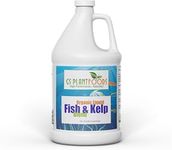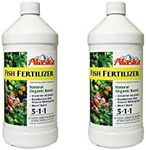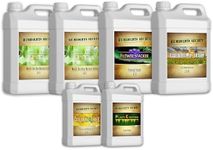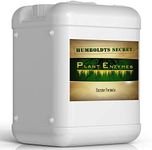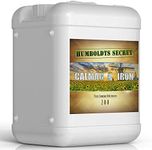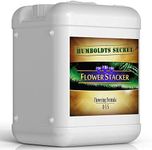Buying Guide for the Best Fish Fertilizer For Plants
Choosing the right fish fertilizer for your plants can significantly impact their growth and health. Fish fertilizers are organic and provide essential nutrients that promote strong root development, lush foliage, and vibrant blooms. When selecting a fish fertilizer, it's important to understand the key specifications and how they align with your gardening needs. This guide will help you navigate through the important aspects to consider, ensuring you pick the best product for your plants.NPK RatioThe NPK ratio represents the proportions of nitrogen (N), phosphorus (P), and potassium (K) in the fertilizer. Nitrogen promotes leafy growth, phosphorus supports root and flower development, and potassium enhances overall plant health. For leafy vegetables, a higher nitrogen ratio (e.g., 5-1-1) is beneficial. For flowering plants, a balanced ratio (e.g., 2-3-1) is ideal. Choose an NPK ratio based on the specific needs of your plants to ensure they receive the right nutrients.
Form (Liquid or Granular)Fish fertilizers come in liquid or granular forms. Liquid fertilizers are fast-acting and easy to apply, making them suitable for quick nutrient uptake and foliar feeding. Granular fertilizers release nutrients slowly over time, providing a steady supply of nutrients. If you need immediate results or prefer foliar feeding, opt for liquid. For long-term feeding and ease of application, granular might be the better choice.
OdorFish fertilizers can have a strong odor due to their organic nature. Some products are deodorized to reduce the smell, making them more pleasant to use, especially in indoor or small garden spaces. If you are sensitive to smells or plan to use the fertilizer in areas where odor could be an issue, look for deodorized options or those specifically labeled as low-odor.
Organic CertificationOrganic certification ensures that the fish fertilizer is made from natural ingredients without synthetic additives. This is important for gardeners who prioritize organic practices and want to avoid chemicals. Look for certifications from reputable organizations to ensure the product meets organic standards. If maintaining an organic garden is important to you, choose a certified organic fish fertilizer.
Application MethodDifferent fish fertilizers have varying application methods, such as direct soil application, foliar spraying, or mixing with water. Consider how you prefer to apply the fertilizer and the convenience of the method. For example, foliar sprays are great for quick nutrient absorption, while soil applications provide a more gradual nutrient release. Choose a method that fits your gardening routine and the specific needs of your plants.
Nutrient ContentBeyond the basic NPK ratio, fish fertilizers can contain additional micronutrients like calcium, magnesium, and trace elements that are beneficial for plant health. These extra nutrients can help address specific deficiencies and promote overall plant vigor. If your plants have specific nutrient needs or you want to ensure a comprehensive nutrient supply, look for fish fertilizers with a broad spectrum of nutrients.
